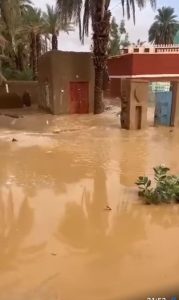Ali Mohamed Ahmed Osman
Charge d’affaires a.i
Embassy of the Republic of Sudan in Tokyo
Double Crisis: RSF Atrocities and Devastating Floods Worsen Humanitarian Catastrophe in Sudan
As Sudan confronts an escalating humanitarian crisis, it has been over 17 months since the failed coup attempt by the terrorist Rapid Support Forces militia (RSF), which has resulted in unimaginable human suffering not previously experienced in Sudan. Reports from reliable sources detail a grim reality characterized by killings, sexual violence, abductions, looting, and arrests that have left the Sudanese people in desperate need of assistance.
The recent flooding, exacerbated by heavy rains, has further intensified the plight of the affected communities. The Federal Ministry of Health has reported that 11 states have been affected, with approximately 40,096 families, resulting in over 176,000 individuals suffering from the devastating effects of these natural disasters. Tragically, the floods have claimed 177 lives and caused significant structural damage, with 18,838 houses completely collapsed and another 15,074 partially collapsed, primarily concentrated in the Northern, Nile River, and Red Sea states.
Despite these natural calamities, the ongoing inaction and indifference of the international community towards the RSF’s atrocities have encouraged the militia to continue perpetrating horrific acts of violence and oppression against the Sudanese people. For example, although the United Nations Security Council has adopted Resolution 2736 (2024), which Demands Rapid Support Forces to Halt the Siege of El Fasher, the militia continues to besiege the town with frequent attacks and bombardments. In North Darfur, it has been reported that the militia is holding 20,000 cartons of humanitarian aid provided by UNICEF, intercepting critical supplies intended for El Fasher City. In a series of violent incidents, the RSF has bombed healthcare facilities, including the South Sahara Centre for Health Sciences and the market in El Fasher, causing injuries to civilians and further crippling essential health services.
Witnesses report that on September 6, the militia targeted neighborhoods in Al-Thawra, resulting in the deaths of three civilians, including a child, while also damaging numerous homes and disrupting the electricity supply. The militia’s terror extends to other areas, where they have looted trucks and impeded medical aid access, particularly in Tuti Island, Khartoum State, where only one health center remains operational for the militia’s benefit.
The situation escalated as the RSF laid siege to the Dar Al-Salam locality headquarters, looting vital communications equipment and fuel supplies. The militia has also been implicated in acts of sabotage against infrastructure in Sennar State, further deepening the crisis by destroying crucial electrical transformers.
In response to the escalating humanitarian crisis in Sudan, the government has intensified its efforts to facilitate aid delivery and improve conditions for affected populations. The Humanitarian Aid Commission (HAC) continues to facilitate the delivery of humanitarian aid by granting all requested entry visas to employees of various foreign NGOs, ensuring that critical assistance can flow into the country. Supporting this endeavor, the Ministry of Foreign Affairs has granted all entry visas requested by personnel from United Nations agencies and international organizations.
Furthermore, the HAC has granted numerous movement permits to foreign non-governmental organizations, whereas the Ministry of Foreign Affairs has granted numerous permits to UN agencies and the International Committee of the Red Cross (ICRC) to operate in various states of Sudan. These permits are crucial for enabling humanitarian workers to access affected regions and deliver essential support.
Efforts to distribute humanitarian aid are underway, with several UN agencies and foreign and local organizations mobilizing resources to assist those in need. For instance, during the week of September 2–8, 13,622 cartons of medicine, medical equipment, health supplies, and food were transported to various Sudan states. UNICEF has played a pivotal role by sending 20,000 cartons of food to El Fasher in North Darfur via El Daba locality, although these supplies remain held by the rebel militia in El Koma locality.
Furthermore, as part of the Kuwaiti humanitarian air bridge initiative, the tenth, eleventh, and twelfth flights have successfully arrived at Port Sudan Airport recently, delivering 68 tons of medical, shelter, and food relief supplies. This support is vital for addressing the immediate needs of vulnerable communities.
In the wake of the recent floods and the accompanying devastation, the Federal Zakat House has recently also provided 1,225 bags of food aid to areas most affected by the torrents in the Red Sea State. Collectively, these government measures reflect a strategic commitment to alleviate suffering and bolster humanitarian assistance efforts during this challenging time in Sudan
The international community has also weighed in, with the Director of the World Health Organization emphasizing the need for increased humanitarian assistance and the proper distribution of aid through designated channels. However, reports of cholera are emerging, with 234 new cases recorded in five states, bringing the cumulative total to 516, including eight deaths.
As the dual crises of RSF atrocities and natural disasters unfold, the already precarious humanitarian situation in Sudan continues to deteriorate. The international community’s failure to provide tangible humanitarian support to Sudan has left countless individuals vulnerable and in dire need. Furthermore, the international community is increasingly under pressure to force the RSF militia to abide by the Jeddah agreement and support humanitarian efforts, as millions remain displaced and in dire need of help. It is crucial that these voices be amplified and that urgent actions be taken to address both the logistical and military support coming to the RSF militia and the suffering caused by nature’s wrath as Sudan bravely endures its darkest hours.
